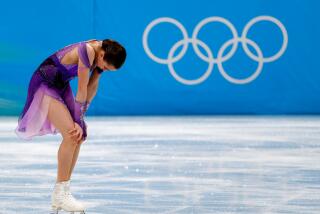NOTES
- Share via
Praising the increased drug-testing efforts surrounding the Sydney Olympics, U.S. anti-drug czar Barry McCaffrey and Health and Human Services Secretary Donna Shalala pledged today that the U.S. government will work to further “raise the bar” for the 2002 Winter Games in Salt Lake City.
“The elite athletes of the world do not wish to compete based on who’s got the best pharmacist,” McCaffrey said.
The federal government will provide $3.3 million to help fund anti-doping programs leading up to Salt Lake City, with the money targeted at expanding and improving testing as well as providing consistent enforcement, McCaffrey said.
Frank Shorter, the former Olympic marathon champion who is chair of the newly created U.S. Anti-Doping Agency, appeared with McCaffrey and Shalala, saying government involvement is necessary to conquer the problem.
“Clean athletes have to come empowered and feel it will not be to their disadvantage if they don’t use these drugs,” Shorter said.
The Sydney Games are notable because this is the first time the IOC has tested for erythropoietin (EPO), a banned performance-enhancing substance that stimulates the creation of red-blood cells allowing athletes to train harder and longer.
The decision was made under pressure shortly before the Games. There have been no positive results among those tested so far.
However, McCaffrey said the newly created World Anti-Doping Agency has recorded about 20 “elevated samples” in testing for other banned substances, though those results have not yet been made public because they are being confirmed and checked for such possibilities as extenuating medical circumstances.
More to Read
Go beyond the scoreboard
Get the latest on L.A.'s teams in the daily Sports Report newsletter.
You may occasionally receive promotional content from the Los Angeles Times.






